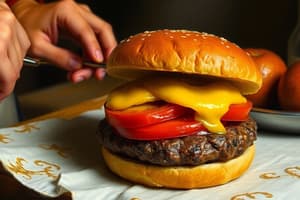Podcast
Questions and Answers
Cooking times can vary depending on several factors such as oven temperature, pan material, equipment type, altitude, humidity, recipe ingredients, etc. While many recipes state cooking times based on average conditions, there is often some wiggle room for adjustment when preparing meals. Here's what you need to know about cooking times: ### Factors Affecting Cooking Times Cooking times can differ due to variations in: 1. Oven Temperature: Higher temperatures heat food more quickly; however, if set too high, it might burn before becoming cooked through. 2. Pan Material & Equipment Type: Different pans cook at different speeds - non-stick may be faster while cast iron takes longer. Similarly, using broiling will typically take longer than baking. 3. Altitude: High altitudes cause air pressure to decrease which causes foods to boil faster but also cook less evenly. 4. Humidity: Dryer conditions in your kitchen allow things like cookies to bake evenly but make cakes dry out quicker. 5. Recipe Ingredients: Certain ingredients absorb liquids differently causing unequal distribution of liquids within a dish leading to inconsistent results across batches with varied amounts of each ingredient. ### Adjustments Based On Conditions To account for these differences, experienced chefs recommend checking the doneness of meat by cutting into it because ______ tend to cook uniformly once they reach their minimum internal temp requirement.
Cooking times can vary depending on several factors such as oven temperature, pan material, equipment type, altitude, humidity, recipe ingredients, etc. While many recipes state cooking times based on average conditions, there is often some wiggle room for adjustment when preparing meals. Here's what you need to know about cooking times: ### Factors Affecting Cooking Times Cooking times can differ due to variations in: 1. Oven Temperature: Higher temperatures heat food more quickly; however, if set too high, it might burn before becoming cooked through. 2. Pan Material & Equipment Type: Different pans cook at different speeds - non-stick may be faster while cast iron takes longer. Similarly, using broiling will typically take longer than baking. 3. Altitude: High altitudes cause air pressure to decrease which causes foods to boil faster but also cook less evenly. 4. Humidity: Dryer conditions in your kitchen allow things like cookies to bake evenly but make cakes dry out quicker. 5. Recipe Ingredients: Certain ingredients absorb liquids differently causing unequal distribution of liquids within a dish leading to inconsistent results across batches with varied amounts of each ingredient. ### Adjustments Based On Conditions To account for these differences, experienced chefs recommend checking the doneness of meat by cutting into it because ______ tend to cook uniformly once they reach their minimum internal temp requirement.
meats
Higher temperatures heat ______ more quickly; however, if set too high, it might burn before becoming cooked through.
Higher temperatures heat ______ more quickly; however, if set too high, it might burn before becoming cooked through.
food
Different ______ cook at different speeds - non-stick may be faster while cast iron takes longer.
Different ______ cook at different speeds - non-stick may be faster while cast iron takes longer.
pans
High altitudes cause air pressure to decrease which causes ______ to boil faster but also cook less evenly.
High altitudes cause air pressure to decrease which causes ______ to boil faster but also cook less evenly.
Dryer ______ in your kitchen allow things like cookies to bake evenly but make cakes dry out quicker.
Dryer ______ in your kitchen allow things like cookies to bake evenly but make cakes dry out quicker.
Certain ______ absorb liquids differently causing unequal distribution of liquids within a dish leading to inconsistent results across batches with varied amounts of each ingredient.
Certain ______ absorb liquids differently causing unequal distribution of liquids within a dish leading to inconsistent results across batches with varied amounts of each ingredient.
Pork Brain
Pork Brain
Marinated Basa Fish
Marinated Basa Fish
Signature Layered Tripes
Signature Layered Tripes
Egg Dumplings
Egg Dumplings
Flashcards are hidden until you start studying
Study Notes
Cooking times can vary depending on several factors such as oven temperature, pan material, equipment type, altitude, humidity, recipe ingredients, etc. While many recipes state cooking times based on average conditions, there is often some wiggle room for adjustment when preparing meals. Here's what you need to know about cooking times:
Factors Affecting Cooking Times
Cooking times can differ due to variations in:
-
Oven Temperature: Higher temperatures heat food more quickly; however, if set too high, it might burn before becoming cooked through.
-
Pan Material & Equipment Type: Different pans cook at different speeds - non-stick may be faster while cast iron takes longer. Similarly, using broiling will typically take longer than baking.
-
Altitude: High altitudes cause air pressure to decrease which causes foods to boil faster but also cook less evenly.
-
Humidity: Dryer conditions in your kitchen allow things like cookies to bake evenly but make cakes dry out quicker.
-
Recipe Ingredients: Certain ingredients absorb liquids differently causing unequal distribution of liquids within a dish leading to inconsistent results across batches with varied amounts of each ingredient.
Adjustments Based On Conditions
To account for these differences, experienced chefs recommend checking the doneness of meat by cutting into it because meats tend to cook uniformly once they reach their minimum internal temp requirement. If something appears underdone after its expected time has passed, extend cooking intervals until completion but check every two minutes instead of waiting full ten minute cycles. Also remember that most roasts require an extra fifteen minutes per pound over the original estimated roasting time.
In conclusion, cooking times depend heavily upon outside variables during preparation and cooking processes which makes them difficult to pin down exactly without taking all possible factors into consideration. However, armed with knowledge about how certain changes affect outcomes we can become better equipped at predicting needed modifications throughout our culinary adventures!
Studying That Suits You
Use AI to generate personalized quizzes and flashcards to suit your learning preferences.




